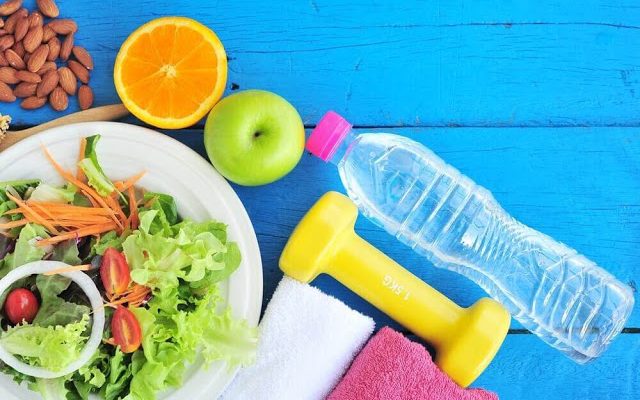Nutrition And Vegetarian Athlete Training: Tips And Tricks
Vegetarians and today still meet
with some surprise and misunderstanding on the part of their opponents
in the “meat” issue. What can we say then about vegetarian athletes –
they can probably make up the top questions from meat eaters who have
had a mouthwash: where do you get protein from? Do you have enough
energy? Can muscle mass grow? How to combine, for example, bodybuilding
and rejection of animal protein?
It turns out that vegetarianism is not such a rare phenomenon among
athletes, including those whose names are known throughout the world.
Bodybuilders Bill Pearl, Roy Halligen, powerlifter Patrick Babumyan,
tennis player Martina Navratilova, basketball players Robert Parish and
John Sally, legendary soccer player Joe Namat, boxer Mike Tyson – living
evidence that giving up meat is not an obstacle to achieving athletic
heights. Over their shoulders, outstanding awards and international
recognition. And all of them, someone earlier, someone later, came to
different forms of vegetarianism.
Vegetarianism and sports: lifestyle and thinking
Sports activities contribute to the fact that a person develops will
power, resistance to stress, endurance and patience. In order to keep
your body in shape, of course, you can restrict yourself to only six or
seven hours a week, when the coach forces you to work out the chocolate
buns eaten before.
However, those people who are seriously concerned not only with
appearance and figure, but also with their own health, well-being, the
state of their internal organs, or, all the more, with significant
sports achievements, approach this topic more comprehensively. For them,
sport becomes a way of life, a kind of philosophy that resonates with
everything they do. The same can be said about vegetarianism: for
someone it’s just a refusal of meat food, while other people look at the
problem as a protest against violence and cruelty, as an opportunity to
find harmony within and in relations with the outside world.
The correct transition to vegetarianism is recommended not to jerk at
one moment, but gradually. There are several varieties of vegetarianism
that correspond to the stages of transition. There are no clear
requirements and limitations – the athlete needs to follow his own
feelings in order to understand the level at which he will be
comfortable to stay.
Phases of the transition to plant foods:
- rejection of warm-blooded meat;
- rejection of the bird;
- rejection of seafood and fish;
- rejection of eggs;
- rejection of dairy products.
Each next level includes the achievements of the previous one.
Veganism is the strictest type of vegetable diet, in which no animal
products are consumed. Some vegan athletes even refuse honey.
How do nutrition without meat and sports workout
An unequivocal answer to the question of whether all types of
vegetarianism are compatible with sports, scientists and biologists do
not yet give. Obviously, a diet that includes meat and animal products
is still habitual for most people since childhood, and a vegetarian
diet, especially at first, is perceived as stress in about 98% of
transitions to it (unless, of course, It does not concern those children
whom parents teach to plant nutrition from infancy).
Some doctors point out that strict veganism and raw foods do not work
well with heavy power loads and workouts, as they cause deficiency not
only of protein, but also of vitamins B12 and D, calcium, magnesium, and
omega-3 fatty acids. The deficiency in the body of these substances
leads to a decrease in immunity, an increase in the risk of inflammatory
processes in the tissues.
It is fair to note that there are a lot of vegetarians among marathon
athletes whose achievements are based on endurance, but fewer among
sprinters.
Bodybuilders, whose diet should be more than 40% protein, the lack of
meat should be compensated by a large number of nuts, legumes,
mushrooms, soy. However, they should be consumed in much larger
quantities than animal protein would be eaten, because the digestibility
of plant foods is 50-60%, while, for example, egg yolk is absorbed by
the body 100%. Another problem in this case is cellulose, which gets
very much into the body of a vegetarian athlete – of course, it helps to
improve the bowels, but at the same time absorbs some of the essential
amino acids.
Creatine, a type of nitrogen-containing carboxylic acid found in
vertebrate animals, is extremely important for muscle mass and strength.
Creatine is involved in energy metabolism in muscle and nerve cells.
Vegetarians do not get this substance with food, so they need to pay
attention to special sports supplements.
Possible problems and tips for overcoming them for vegetarian athletes
Indeed, athletes who have no animal products in their diets (meat,
milk, fish, eggs) are subject to more risks and difficulties than their
counterparts who do not adhere to vegetarian principles. However, all
these points can be considered and calculated. Proper problem analysis
allows you to select the appropriate solutions.
What do vegetarians who are constantly involved in sports do to
prevent protein deficiency by eating food without meat? The required
amount of protein for athletes is about 1.4-1.8 g per 1 kg of weight.
For those who allow eggs and dairy products in their diets, the question
is not critical: out of these products, the body receives the necessary
portions of protein, if enough of them are consumed.
Doctors-nutritionists recommend that strict vegetarians combine
different products to get the necessary amino acids and other
substances. For example, dishes made from a combination of cereals and
legumes give good protein saturation, although in cereals in their pure
form there is a lack of lysine-containing amino acids, and in legumes –
of sulfur-containing ones. It is also recommended to combine nuts and
seeds with cereals and legumes. For those who allow themselves milk, the
choice is even wider – you can combine milk with cereals and legumes to
get high-grade protein.

.jpg)


Comments
Post a Comment